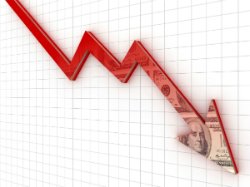| Back to Back Issues Page |
 |
|
This will help you face a market slump. Dividend Investors Detox Nov 18 November 09, 2018 |
Dear Dividend Investor,This information will help you face a market slump - Are interest rates to blame? If so, what should I do?
"Interest rates are like gravity" according to Warren Buffett. Interest rates have started to rise recently in the US and some are blaming this for falls in the stock market we saw in October. Are more falls therefore just around the corner? Do movements in interest rates really have that big an effect stock prices? If so, can you use this knowledge to your advantage? First of all: do interest rates affect stock prices?The simple answer is "yes". They do it in two significant ways:1. Higher interest rates increase the costs of businesses which have debt (most of them), thus lowering profits to shareholders and thereby lowering their likely valuations and possibly dividends. 2. Higher interest rates also mean investors are likely to switch their investments from stocks into bonds or cash, whose lower or no-risk yields largely track interest rates and this sell off can put downward pressure on stock prices. Other articles you might like:
An example:Imagine interest rates suddenly went up to 15%. Sounds ridiculous today, but that's where they were in the early 1980s!Every company would have to make interest payments of at least $150,000 per $1million of debt, and that $150,000 is money lost to the business which would otherwise have been used to grow or return to investors in dividends, both of which are good for shareholders. Secondly if you were an investor looking at buying these shares, which might (for example) be expected to return an otherwise healthy 10% if the business had a fairly typical Price-to-Earnings Ratio (P/E) of 10, you would be discouraged from doing so because government bonds (whose "coupon" or rate of return is usually close to the interest rate) would be offering investors close to 15%, so buying the company's shares suddenly look very unattractive. This would almost certainly result in the stock price slumping to a point where stocks were attractive once again, say where likely returns were 20% (roughly speaking a P/E of 5) meaning the stock price would need to halve, all else being equal. This is why interest rates act as "gravity". They serve as a guide price for the value of stocks. Over time, if interest rates keep rising then the Price / Earnings multiple on stocks is likely to come down unless growth rates pick up. When interest rates fall back again, then, all else being equal, the reverse will happen: stock prices should go up. The fact that we have had unprecedentedly - arguably artificially - low interest rates is almost certainly one of the main reasons that stocks have performed so well between 2009-2018. Cheap money usually means people pay up for risk. Can you use this knowledge to your advantage?Tempting though it is, I don't think investors should try to predict interest rates or other macro-economic indicators in order to spot a potential rise or fall in the market. This is something that thousands of professional forecasters attempt to do and even they find it very hard.Instead, keep your focus on finding and buying high quality businesses that are likely to produce a high return on equity with a strong balance sheet for very long periods of time. Companies with low debt are also less susceptible to interest rate rises. If you invest in a number of those types of stocks then you are likely to do well whether interest rates are going up or down. Quality and compound interest are your best defences. Three final thoughts on interest rates that might help to free you up from "fear of the unknown" or "paralysis by analysis" which are normal investor reactions to a falling market:1. If stock prices do indeed fall due to higher interest rates, this is GREAT NEWS if you're a buyer and are not looking to cash out (i.e. retire on your dividends) in the near future. Lower stock prices mean better value purchases and higher returning assets can be found for the same risk, all else being equal.2. Holding stocks with little or no debt (one of the magic filters I use to search for stocks) during higher interest rate periods should put you at an advantage. Companies with money in the bank actually make more money as interest rates rise, while at the same time the majority of their competitors see costs increase. This therefore puts them at a significant advantage with lower risk. It is true that companies with high debt would benefit during a time of falling interest rates but this is a risk I think you should try to avoid. 3. Finally, higher interest rates, often lead businesses to be more savvy with their money (the cost of capital is higher after all). If money is cheap managers feel they have to go for growth at all costs which can mean making unwise, often overpriced acquisitions and risky expansion plans. Higher interest rates force a reality check on most businesses which have to borrow to fund expansion yet well-run and debt-free companies generally have more options to grow profits in these circumstances. Keep seeking quality!Mike Roberts |
| Back to Back Issues Page |